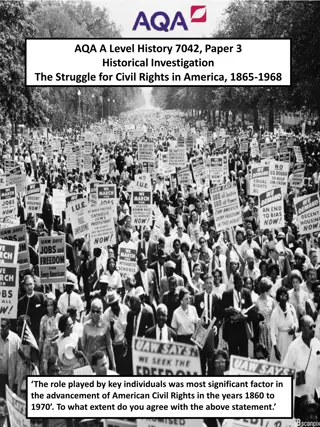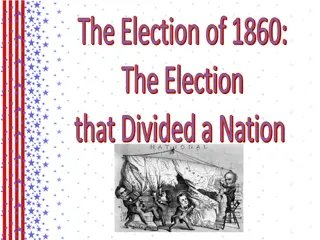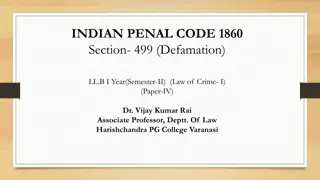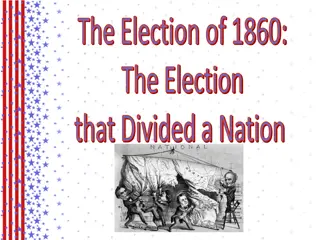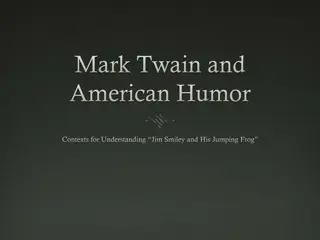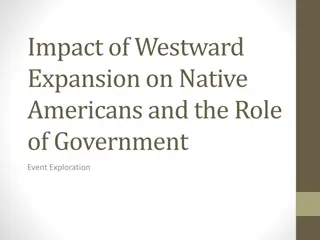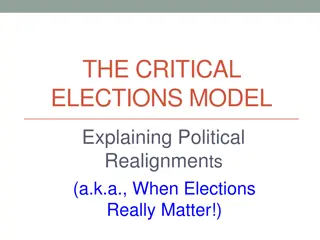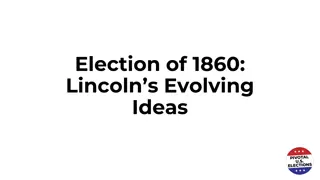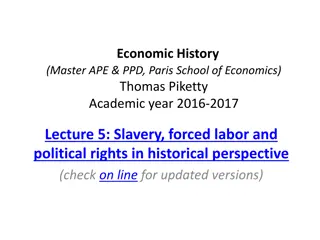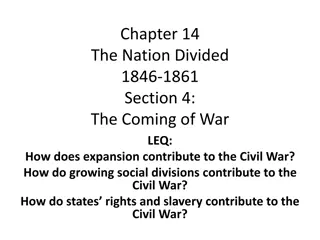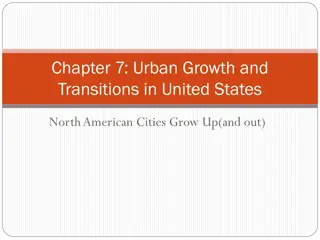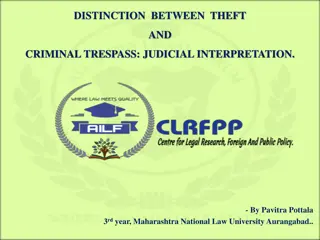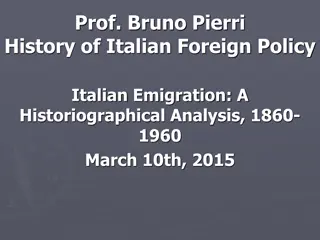Role of Key Individuals in Advancing American Civil Rights, 1860-1970
The role played by key individuals in the advancement of American Civil Rights in the years 1860 to 1970 is a significant factor. AQA A Level History coursework guidelines outline the skills needed to analyze, evaluate, and make judgments on historical debates using evidence from primary and seconda
0 views • 29 slides
The Election of 1860: A Divisive Campaign for the Future of the United States
The 1860 election was a significant moment in American history, marked by ideological divisions and the rise of Abraham Lincoln. The Republican Party, Southern Democratic Party, Democratic Party, Northern Democratic Party, and Constitutional Union all played crucial roles in shaping the outcome. The
1 views • 14 slides
Understanding Defamation Laws in Indian Penal Code 1860 Section 499
Indian Penal Code Section 499 defines defamation as making or publishing any imputation concerning a person intending harm or knowing it will harm their reputation. The section includes explanations regarding imputations towards deceased individuals, companies, and ironic expressions. To constitute
1 views • 10 slides
Development of Indian Penal Code (IPC) 1860 and Its Impact in British India
The Indian Penal Code (IPC) of 1860 was introduced in British India after a series of historical events led to the need for a comprehensive criminal justice system. The disintegration of the Mughal Empire paved the way for British takeover, resulting in variations in criminal laws across different B
1 views • 24 slides
The Election of 1860: A Historic Moment in American Politics
The election of 1860 was a pivotal moment in American history, marked by the rise of the Republican Party with Abraham Lincoln as its candidate. This election showcased the division in the Democratic Party, leading to the victory of Lincoln despite hostilities between the North and South. The Consti
4 views • 14 slides
Italian Military Policy and National Challenges: A Historical Analysis
The history of Italian military policy from 1860 to 1960 reveals a complex relationship between the army, state, and society. The military's role in defending new territories and maintaining internal order, along with its performance in battles such as Lissa and Custoza, reflects a transitional peri
0 views • 20 slides
Mark Twain and American Humor: Exploring Southwestern Humor and 19th-century Jokes
Delve into the roots of American humor through the works of Mark Twain, examining Southwestern humor from 1830-1860 characterized by tall tales and dialect humor. Discover the wit of women humorists like Frances Whicher and Marietta Holley. Explore humor forms like anecdotes, hoaxes, and frame tales
0 views • 17 slides
Impact of Westward Expansion on Native Americans: Government's Role & Effect
Explore the impact of western expansion on Native Americans during 1860-90 and analyze the role of the federal government through primary source documents revealing events, perspectives, and policies affecting Native lives amidst the changing landscape of the West.
1 views • 8 slides
Horse Facts and History Overview
Explore interesting facts about horses, including their vocabulary, classifications, and history. Learn about different terms associated with horses, such as filly, mare, stud, and more. Delve into horse-related concepts like gestation, foaling, and unsoundness. Additionally, discover historical mil
0 views • 35 slides
Italian Foreign Policy: History and Paradigms from the 19th Century
Examining Italian foreign policy from 1860 to 1922, this analysis delves into the contrasting diplomatic styles of Italy and France, the outcomes of the Risorgimento movement, the pursuit of parity with European powers, and the concept of "Artichoke policy." It highlights Italy's unique approach to
0 views • 49 slides
Trail of Tears Forced Removal from Oregon and California Coast
Joel Palmer and Federal Indian Policy oversaw the forced removal of Native peoples from Rogue River Valley and southern Oregon/northern California coast to the Siletz Coast Reservation between 1856-1860. The brutal journeys, including the First Removals in January 1856 and the harrowing Journey from
0 views • 22 slides
Understanding Critical Elections Model: Political Realignments
Critical Elections Model explains significant shifts in party loyalty and control of the political system. Historical examples like the 1860 and 1932 elections showcase lasting impacts on government structures due to key issues that divided parties. The model highlights the importance of national is
0 views • 12 slides
Insights into Italian Foreign Policy and Economy in the 19th Century
This content delves into the history of Italian foreign policy and trading policies between 1860 and 1960, focusing on the perceptions of Italy from abroad, the pre-unitarian inheritance of the Kingdom of Two Sicilies, and the societal and economic landscape of Naples and Sicily during the 19th cent
0 views • 30 slides
Exploring American Romanticism: The Spirit of Nature and Imagination
American Romanticism from 1800-1860 was a movement that valued intuition and feeling over reason, embracing inner experiences and the power of imagination. It sought to escape the corrupting influence of civilization, embracing unspoiled nature and youthful innocence. The era championed individual f
1 views • 10 slides
Election of 1860: Lincoln's Changing Views on Slavery and Federal Authority
The election of 1860 marked a turning point, leading to secession of states and the start of the Civil War. Abraham Lincoln initially pursued a moderate stance on slavery to keep states in the Union. His evolving ideas on liberty, equality, and government are reflected in his speeches. The outcome s
0 views • 10 slides
Historical Perspective on Slavery: Impact and Relevance
Explore the historical context of slavery, from Ancient Greece and Rome to the pre-1860 Southern US, and its long-term implications on societies. Delve into the debates on compensation, racial discrimination, and the comparison with debt and serfdom, shedding light on the continuum between slavery a
0 views • 51 slides
Understanding the Factors Leading to the Civil War
Explore the key elements contributing to the Civil War, such as expansion, social divisions, states' rights, and slavery through the context of the election of 1860, secession of southern states, and the outbreak of the war. Delve into the impact of Abraham Lincoln's presidency and the division amon
0 views • 29 slides
Abraham Lincoln and the Election of 1860
Abraham Lincoln, a self-educated Illinois frontiersman, entered national politics through debates against Stephen Douglas in 1858. The 1860 Democratic Convention faced division over slavery issues, leading to the emergence of multiple candidates. The Republican Convention strategically nominated Abr
0 views • 9 slides
The Civil War: Causes, Advantages, and Impact
The American Civil War was ignited by South Carolina's secession in 1860, leading to conflict over slavery and states' rights. President Lincoln fought to preserve the Union, not abolish slavery. The war saw economic developments like the Homestead Act and Morrill Land Grant, along with increased ta
0 views • 11 slides
Urban Growth and Transitions in United States North American Cities
The chapter explores the stages of capitalism and urbanization in American cities, focusing on the tradition of privatism and factors influencing city building processes. It delves into major settlements and the evolution of cities in the New Nation from 1790 to 1860, highlighting their characterist
0 views • 26 slides
A Historical Analysis of Italian Foreign and Trading Policies, 1860-1960
Prof. Bruno Pierri delves into the history of Italian foreign policy and trading practices from 1860 to 1960, examining Italy's economic strength, pre-unitarian inheritance, societal dynamics in Naples-Sicily, and the economic landscape of the region, including the significance of agriculture, indus
0 views • 30 slides
Understanding the Distinction Between Theft and Criminal Trespass
Exploring the nuances between theft and criminal trespass under the Indian Penal Code 1860, this study delves into the essential ingredients, punishments, and kinds of offenses associated with each. It emphasizes the importance of judicial interpretation in distinguishing these two crimes, providing
0 views • 10 slides
Italian Emigration: A Historiographical Analysis, 1860-1960
Italian emigration between 1860 and 1960 saw significant numbers of Italians leaving the country for various destinations, particularly the Americas. The emigration trend reflected the failures of the Liberal state and highlighted issues with the laissez-faire approach, leading to challenges in addr
0 views • 39 slides
Overview of Plant Quarantine and Disease Management
Plant quarantine is a crucial practice that involves regulating the movement of plants and plant products to prevent the spread of pests and diseases. Originating with the first law in France in 1860, plant quarantine now encompasses various methods such as embargoes and inspections to safeguard pla
0 views • 11 slides
Italian Emigration: A Historical Analysis, 1860-1961
Italian emigration from 1860 to 1961 was a significant phenomenon with millions of Italians permanently relocating abroad. The emigration process saw notable shifts in patterns and destinations over the years, reflecting underlying socio-economic factors and governmental approaches. Despite the libe
0 views • 39 slides
